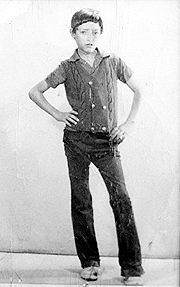CARLOS PATRICIO FARIÑA OYARCE

''He was happy, good at football and helpful around the home''
In June 2000, 27 years after he was taken from his home by members of the security forces, the remains of Carlos Fariña Oyarce were uncovered by construction workers on wasteland in the western part of Santiago. He was 13 years old at the time of his abduction and is the youngest of the ''disappeared'' prisoners of Chile. According to his brothers, his body bore the signs of 12 gunshot wounds - four in the head and eight in the back. His mother, Josefina Oyarce died from cancer in 1977 before her son's remains were located.
Carlos Fariña Oyarce was detained on 13 October 1973 by members of the Yungay army regiment of San Felipe, Carabineros (uniformed police) and Investigaciones (criminal investigations police) who entered the family home in Conchalí on the outskirts of Santiago at about 10 in the morning. The men asked for Carlos to be handed over. Two of the Carabineros pulled him out of bed and one of them hit him hard in the chest with a rifle butt causing Carlos to fall over. According to his mother's testimony, he was practically dragged out of the house and taken to the local football field where other people who lived in the area had been rounded up by the security forces. His mother pleaded with the officer in charge of the troops to let her son go because he was ill but was told that he would be handed back when he was grown up. Carlos Fariña was subsequently driven away in a military jeep by two soldiers and taken to an unknown destination.
Shortly before his arrest, Carlos Fariña had been involved in an incident in which a young neighbour had accidentally been wounded with a gun that Carlos had been looking after for a local older boy. The neighbour's mother went to the local police station to denounce the incident. On discovering what happened and on the advice of the police, Carlos Fariña's mother took him to the local youth court. The court ordered him to be sent to a Youth Detention Centre but the child ran away after apparently being sexually abused. He arrived home with a high temperature and his mother decided to wait for him to get better before telling the judge what had happened. The mother of the child who had been wounded, unaware of the reasons for Carlos leaving the detention centre, informed the security forces who were conducting house-to-house searches in the area.
Following his ''disappearance'', Josefina Oyarce began to search for her son. On 2 April 1974, she submitted a recurso de amparo (similar to a writ of habeas corpus) to the Santiago Appeals Court asking among other things for the Minister of Defence to identify the army regiment that had been based in the area at the time of Carlos' arrest and for information from police officials and from Secretaría Ejecutiva Nacional de Detenidos (SENDET), National Executive Secretariat for Detainees. In May 1974, General Oscar Bonilla, Minister of the Interior at the time, told the Appeals Court that the minor was not in custody and that the government did not know his whereabouts. On 15 June 1974, the court sent a request to the Ministry of Defence which replied in October saying, ''as it concerns individuals denounced to the military courts, the relevant information was sent to the Ministry of the Interior''. On 14 November 1974, the court rejected the recurso de amparo that had been submitted seven months previously and sent the case to the local criminal court.
On 14 June 1976, Josefina Oyarce submitted a complaint for the abduction of her son to the 3rd Criminal Court (Tercero Juzgado del Crimen) in Santiago which transferred the case to the 10th Criminal Court (Décimo Juzgado del Crimen). On 21 June, this court accepted jurisdiction and opened a file into the case. On 6 September, the judge closed the case temporarily (sobreseído temporalmente). This decision was confirmed by the Santiago Appeals Court on 13 October.
In the lists the Chilean Government presented to the United Nations of people in detention, Carlos Oyarce is registered as having ''no legal existence'', despite his name being correctly registered on his birth certificate. According to his brothers, because Carlos was too young to have an identity card, his name was erased from all the state registers.
Carlos Oyarce's brothers described their sibling as ''happy, good at football and helpful round the house'' (alegre, bueno para el fútbol y colaborador en la casa). He went to the Peru School (Escuela Perú) in Conchalí. Among his remains was the identity card of one of two friends arrested with him whose name is among those of people who were executed by the security forces.
In August 2000, his brothers submitted a criminal complaint to investigating Judge Juan Guzmán for war crimes, injuries, abduction of a minor, murder and illegal burial (querella por crímenes de guerra, lesiones, sustracción de un menor de edad, homicidio e inhumación ilegal) against Augusto Pinochet and against the commander of the Yungay Regiment.
The case is currently being investigated by the judge of the Tenth Criminal Court (Décimo Juzgado el Crimen de Santiago) of Santiago, one of the nine judges appointed by the Supreme Court in June 2001 to look exclusively at cases of the ''disappeared''.
Source; Amnesty International – Document: AI Index: AMR 22/014/2001 dated 10 December 2001 – Titled ; CHILE - Testament to suffering and courage: the long quest for justice and truth